
The pharmaceutical industry discovers, develops, produces, and markets drugs or pharmaceutical drugs for use as medications to be administered to patients, with the aim to cure them, vaccinate them, or alleviate symptoms. Pharmaceutical companies may deal in generic or brand medications and medical devices. They are subject to a variety of laws and regulations that govern the patenting, testing, safety, efficacy and marketing of drugs. The global pharmaceuticals market produced treatments worth $1228.45 billion in 2020 and showed a compound annual growth rate (CAGR) of 1.8%.
Many countries have measures in place to limit advertising by pharmaceutical companies.

Ben Michael Goldacre is a British physician, academic and science writer. As of March 2015, he is a senior clinical research fellow at the Centre for Evidence-Based Medicine, part of the University of Oxford's Nuffield Department of Primary Care Health Sciences. He is a founder of the AllTrials campaign and OpenTrials to require open science practices in clinical trials.

Doxazosin, sold under the brand names Cardura among others, is a medication used to treat symptoms of benign prostatic hyperplasia and hypertension. For high blood pressure, it is a less preferred option. It is taken by mouth.
Good clinical practice (GCP) is an international quality standard, which governments can then transpose into regulations for clinical trials involving human subjects. GCP follows the International Council on Harmonisation of Technical Requirements for Registration of Pharmaceuticals for Human Use (ICH), and enforces tight guidelines on ethical aspects of clinical research.
Pharmaceutical sales representatives are salespeople employed by pharmaceutical companies to persuade doctors to prescribe their drugs to patients. Drug companies in the United States spend ~$5 billion annually sending representatives to doctors, to provide product information, answer questions on product use, and deliver product samples. These interactions are governed according to limits established by the Code on Interactions with Health Care Professionals, created by the Pharmaceutical Research and Manufacturers of America (PhRMA). This code came into practice in 2002 and has since been updated to help define ethical interactions between health care professionals and the pharmaceutical companies
Patrick Holford is a British author and entrepreneur who endorses a range of controversial vitamin tablets. As an advocate of alternative nutrition and diet methods, he appears regularly on television and radio in the UK and abroad. He has 36 books in print in 29 languages. His business career promotes a wide variety of alternative medical approaches such as orthomolecular medicine, many of which are considered pseudoscientific by mainstream science and medicine.
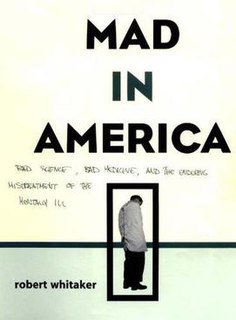
Mad in America: Bad Science, Bad Medicine, and the Enduring Mistreatment of the Mentally Ill is a 2002 book by medical journalist Robert Whitaker, in which the author examines and questions the efficacy, safety, and ethics of past and present psychiatric interventions for severe mental illnesses, particularly antipsychotics. The book is organized as a historical timeline of treatment development in the United States.

Robert Whitaker is an American journalist and author, writing primarily about medicine, science, and history. He is the author of five books, three of which cover the history or practice of modern psychiatry. He has won numerous awards for science writing, and in 1998 he was part of a team writing for the Boston Globe that was shortlisted for the 1999 Pulitzer Prize for Public Service for a series of articles questioning the ethics of psychiatric research in which unsuspecting patients were given drugs expected to heighten their psychosis. He is the founder and publisher of Mad in America, a webzine critical of the modern psychiatric establishment.
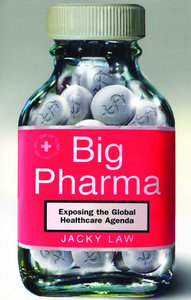
Big Pharma: How the World's Biggest Drug Companies Control Illness is a 2006 book by British journalist Jacky Law. The book examines how major pharmaceutical companies determine which health care problems are publicised and researched.

The Association of the British Pharmaceutical Industry (ABPI) is the trade association for over 120 companies in the UK producing prescription medicines for humans, founded in 1891. It is the British equivalent of America's PhRMA; however, the member companies research, develop, manufacture and supply 80% of the medicines prescribed through the National Health Service.
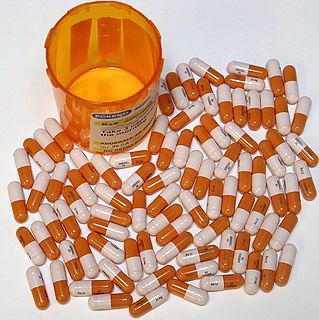
The pharmaceutical lobby refers to the representatives of pharmaceutical drug and biomedicine companies who engage in lobbying in favour of pharmaceutical companies and their products.
The ethics involved within pharmaceutical sales is built from the organizational ethics, which is a matter of system compliance, accountability and culture. Organizational ethics are used when developing the marketing and sales strategy to both the public and the healthcare profession of the strategy. Organizational ethics are best demonstrated through acts of fairness, compassion, integrity, honor, and responsibility.
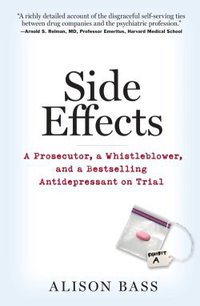
Side Effects: A Prosecutor, a Whistleblower, and a Bestselling Antidepressant on Trial is a nonfiction book by investigative journalist Alison Bass that chronicles the lawsuit filed in 2004 against GlaxoSmithKline by then New York Attorney General Eliot Spitzer.
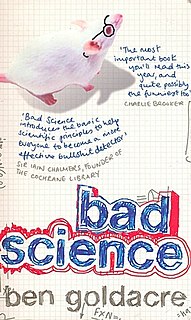
Bad Science is a book by Ben Goldacre, criticising mainstream media reporting on health and science issues. It was published by Fourth Estate in September 2008. It has been positively reviewed by the British Medical Journal and the Daily Telegraph and has reached the Top 10 bestseller list for Amazon Books. It was shortlisted for the 2009 Samuel Johnson Prize. Bad Science or BadScience is also the title of Goldacre's column in The Guardian and his website.
Pharmaceutical fraud involves activities that result in false claims to insurers or programs such as Medicare in the United States or equivalent state programs for financial gain to a pharmaceutical company. There are several different schemes used to defraud the health care system which are particular to the pharmaceutical industry. These include: Good Manufacturing Practice (GMP) Violations, Off Label Marketing, Best Price Fraud, CME Fraud, Medicaid Price Reporting, and Manufactured Compound Drugs. Examples of fraud cases include the GlaxoSmithKline $3 billion settlement, Pfizer $2.3 billion settlement, and Merck $650 million settlement. Damages from fraud can be recovered by use of the False Claims Act, most commonly under the qui tam provisions which rewards an individual for being a "whistleblower", or relator (law).

Bad Pharma: How Drug Companies Mislead Doctors and Harm Patients is a book by the British physician and academic Ben Goldacre about the pharmaceutical industry, its relationship with the medical profession, and the extent to which it controls academic research into its own products. It was published in the UK in September 2012 by the Fourth Estate imprint of HarperCollins, and in the United States in February 2013 by Faber and Faber.

AllTrials is a project advocating that clinical research adopt the principles of open research. The project summarizes itself as "All trials registered, all results reported": that is, all clinical trials should be listed in a clinical trials registry, and their results should always be shared as open data.
The Big Pharma conspiracy theory is a group of conspiracy theories that claim that the medical community in general and pharmaceutical companies in particular, especially large corporations, operate for sinister purposes and against the public good, and that they conceal effective treatments, or even cause and worsen a wide range of diseases for the only purpose of profitability. Specific variations of the conspiracy theory have included the claim that natural alternative remedies to health problems are being suppressed, the claim that drugs for the treatment of HIV/AIDS are ineffective and harmful, the claim that a cure for all cancers has been discovered but hidden from the public, and claims that COVID-19 vaccines are ineffective and that alternative cures are available for COVID-19. In each case the conspiracy theorists have blamed pharmaceutical companies' search for profits. A range of authors have shown these claims to be false, though some of these authors nevertheless maintain that other criticisms of the pharmaceutical industry are legitimate.
The Lancet MMR autism fraud centered on the publication in February 1998 of a fraudulent research paper titled "Ileal-lymphoid-nodular hyperplasia, non-specific colitis, and pervasive developmental disorder in children" in The Lancet. The paper, authored by now discredited and deregistered Andrew Wakefield, and listing twelve coauthors, falsely claimed non-existent, causative, links between the MMR vaccine, colitis, and autism. The fraud was exposed in a lengthy Sunday Times investigation by reporter Brian Deer, resulting in the paper's retraction in February 2010 and Wakefield being struck off the UK medical register three months later.